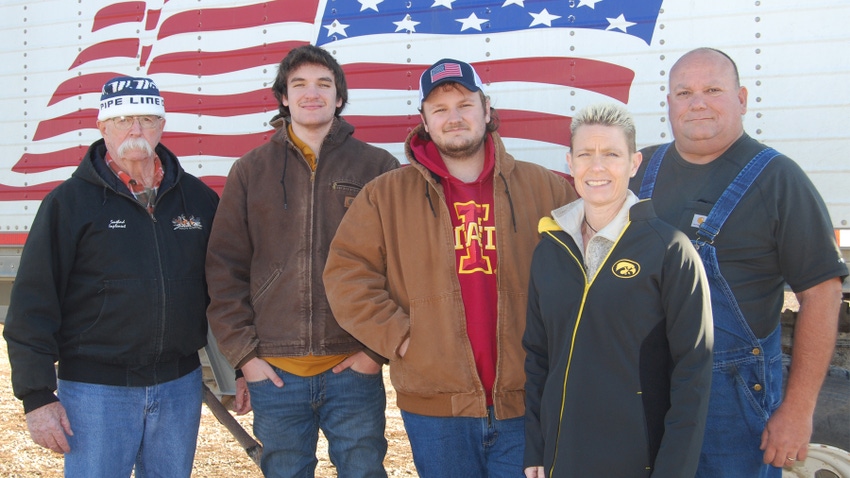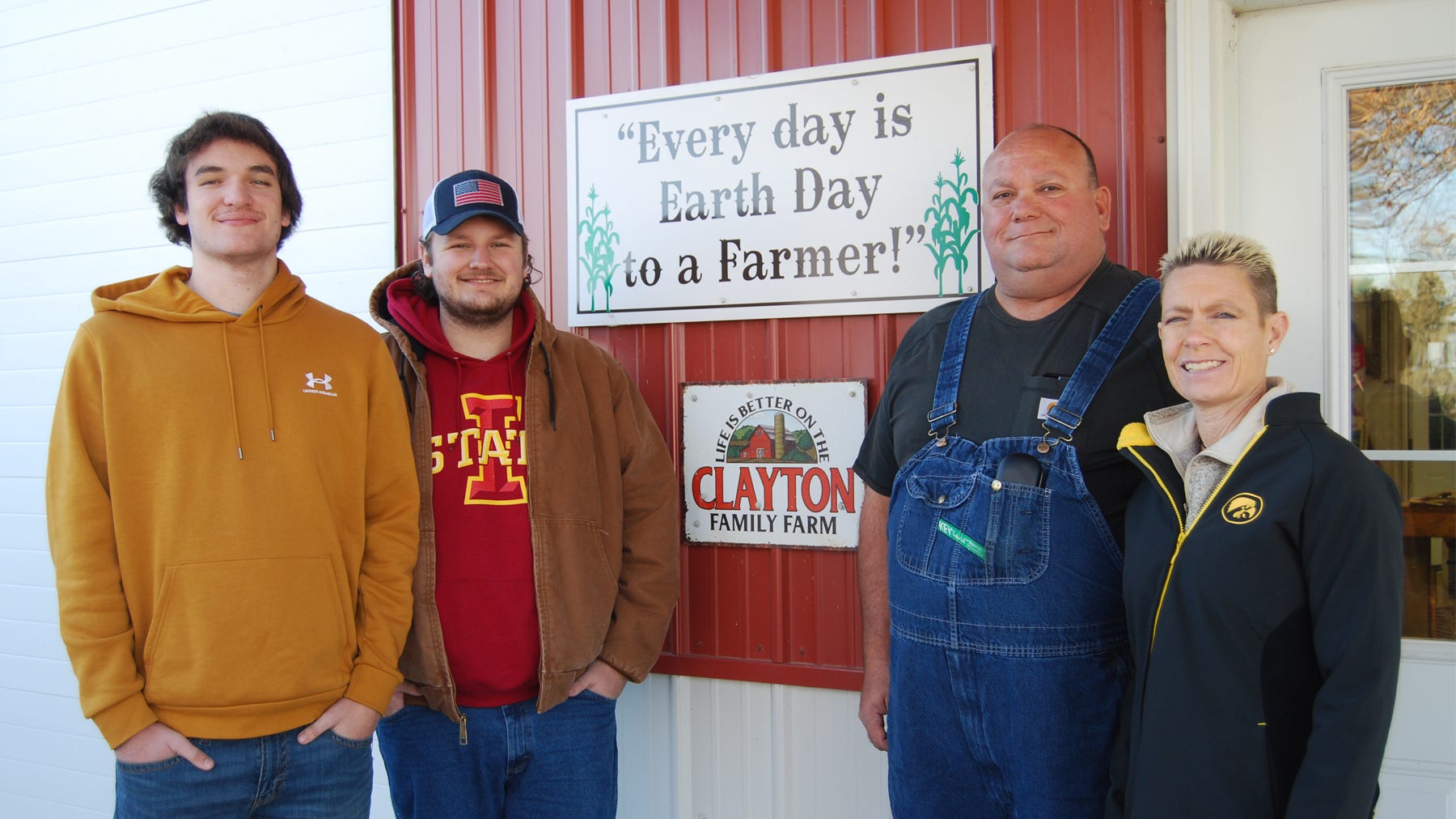December 21, 2023

At a Glance
- Iowa program provides a tax credit for leasing assets to beginning farmers.
- It’s an incentive for landowners to help a beginning farmer rent farmland.
- Landowners can get various benefits depending on the type of lease agreement.
Farming north of Grinnell in east-central Iowa, Scott Clayton began using the Iowa Beginning Farmer Tax Credit program in 2012, renting land from his parents as he started farming full time. Today, Scott and wife Jill are helping the next generation of the family launch farming careers. Son Ben and nephew Dominick are college students who hope to join the family farming operation someday.
“I graduated from Iowa State University in 1997,” Scott recalls. “At the time, coming home to farm with my family wasn’t a sound financial option.”
He had other jobs for a while. In 2007, Scott came back and worked on the family farm as an employee. In 2012, his dad, Ron, decided to retire. Scott began farming full time, renting the land from his parents.
Scott was able to do that, thanks to state income tax credits that the Iowa Beginning Farmer Tax Credit program provided to his parents, as well as Dean McClelland, a neighbor who farmed in partnership with Ron for almost 50 years. Dean and Ron got the tax credit for renting farmland to Scott, which helped him get started. Scott rented most of the land on a 50-50 crop share lease and some on cash rent.
Gaining access to land
“We heard about the BFTC program and went through the process of applying in 2012,” Scott says. “One of the nice things with this program is it’s not age-based. If you’re 18 years old or older and have a net worth under a certain amount and meet the rest of the requirements, you can qualify as a beginning farmer. The tax credit goes to the asset owner — the person you rent the land or machinery from.”
The tax credit gives landlords an incentive to rent to a beginning farmer, but they have to follow the rules. For example, cash rents can’t exceed a certain amount, based on the county average. Once a lease agreement is approved, the lease can’t be changed unless it benefits the beginning farmer.
The lease can be two to five years. The longer the lease, the higher the tax credit, encouraging a longer lease.
“We had a 50-50 crop share, which also provides a higher tax credit than what a landlord can get with a cash rent lease,” Scott says. Another advantage of a crop share is you can use the crop insurance’s actual production history on those fields. “The amount of coverage available is based on the APH.”
Advantages add up
Scott’s first lease was five years. “That got us to 2017,” he notes. “We signed up for the BFTC program again in 2018 with leases for another five years. I continued with a 50-50 crop share, renting from my parents. Jill rented her land on cash rent.”
In 2023, Scott and Jill reached the program’s net worth cap and can’t continue to participate. A qualified beginning farmer is eligible to participate until the farming operation reaches a certain net worth (under $833,000 for 2023). In 2012, when Scott began participating in the program, the net worth limit was a lot less. In 2022, it had to be under $737,000.
Reaching the net worth cap and no longer allowed to participate in the BFTC doesn’t bother Scott. He looks at it as a measure of success, and he hopes Iowa continues the program.
“We finally achieved our goal,” he says. “We’ve grown our farming operation and our net worth, thanks to the help of this program.”
Equipment leasing option
The BFTC program provides an income tax credit for more than just leasing land. It offers equipment and farm building lease options, too.
“That’s an opportunity for me to transfer farm machinery to my son and nephew,” Scott says. “I own the assets and can get an Iowa income tax credit for leasing those assets [machinery and buildings] to a qualified beginning farmer.”
That option has tax advantages for both the asset owner and a beginning farmer. “I can lease my equipment to the beginning farmer,” Scott says. “If we have a lease-to-own agreement, it would provide an advantage for both of us. I’d receive the income tax credit, and the beginning farmer would benefit, too.”
If you sell equipment on a payment plan, you still have to report the entire selling price the first year. You can’t count it as annual income spread over several years. But with a lease-to-own agreement, you can spread income over the years of the lease, which is an advantage for both seller and the young farmer buyer.
Get help and plan ahead
Today, the Clayton family farms about 1,300 acres, all crops. They no longer raise livestock, except for Dominick’s herd of goats. With an eye to the future, he’s learning to raise specialty livestock.
For the Claytons, adding more acres would generate more income and help the next generation get started farming.
“Today, our farm operation isn’t big enough to support three families,” Scott says, adding that they’ll continue planning. “Ben and Dominick may have to work in off-farm jobs for a while after graduating from college, and also help on the farm.”

GETTING STARTED: The Iowa Finance Authority offers a program to incentivize established farmers to assist beginning farmers. Scott and Jill Clayton, farming with nephew Dominick (left) and son Ben, have participated in the program, all to carry forward the Clayton family farm legacy.
How does the tax credit program work?
The Beginning Farmer Tax Credit Program, administered by the Iowa Ag Development Division of the Iowa Finance Authority, offers an income tax credit to landowners who rent to qualified beginning farmers.
That makes it an opportunity for both the asset owner and the beginning farmer, says Kitt Tovar Jensen, staff attorney with the Center for Ag Law and Taxation at Iowa State University, and manager of the ISU Beginning Farmer Center.
“It helps a beginner be more competitive,” Tovar Jensen says. “They usually can’t pay top dollar to rent land. But they bring a lot of other things to the table that can help landowners and make the financial side more desirable.”
She adds that this isn’t a tax deduction, and it’s only for Iowa, not federal, income taxes. The taxpayer can subtract the income tax deduction directly from any taxes owed.
Iowa legislators created the BFTC program to help beginning farmers access land. Since 2007, the program has helped transfer agricultural assets from eligible taxpayers to qualifying beginning farmers participating in the program. Here’s more background on BFTC:
Program basics. The program provides an Iowa tax credit for owners to lease land, equipment or buildings to beginning farmers. Eligible assets must be in Iowa and include ag land, buildings and depreciable property (machinery, equipment, breeding livestock).
Ineligible assets are rural residences, farmland enrolled in the Conservation Reserve Program, and livestock that’s not depreciable such as feeder cattle, feeder pigs and feeder lambs.
The asset owner must be able to own farmland under Iowa’s corporate farming law, must have entered into a lease with a qualified beginning farmer and can’t be at fault for terminating a lease with a beginning farmer.
The beginning farmer must be an Iowa resident, at least 18 years of age, and have a net worth under $833,000 (in 2023). The beginner must have sufficient education, training or experience for the anticipated farm operation, and have access to adequate working capital, equipment and other items necessary to operate the farm. The beginner can’t sublease and can’t own more than 10% of the agricultural asset.
Lease specifics. To qualify, a cash rent, hybrid or flex lease can be used. The asset owner can be awarded a tax credit equal to 5% of the amount paid in the lease agreement.
In a crop share lease, the asset owner can be awarded a tax credit equal to 15% of the agreement. The crop share lease doesn’t have to be a traditional 50-50 split between landlord and tenant.
Additional benefits. Other reasons to cultivate the next generation include ensuring your land stays in responsible production. Beginning farmers are more willing to adopt environmentally friendly techniques and try new technology, and they can help grow the local food system that may include niche markets and and direct-to-consumer sales. Those entrepreneurial activities stimulate local economies. And with rural populations declining, more farmers coming back to farm can help the local economy.
The Iowa Ag Development Division of the Iowa Finance Authority also has a Beginning Farmer Loan Program. For more information, visit the ISU Beginning Farmer Center at beginningfarmer.iastate.edu. And for tax credit details, visit the Beginning Farmer Tax Credit program, email [email protected] or call 515-452-0400.
Read more about:
Beginning FarmersAbout the Author(s)
You May Also Like






